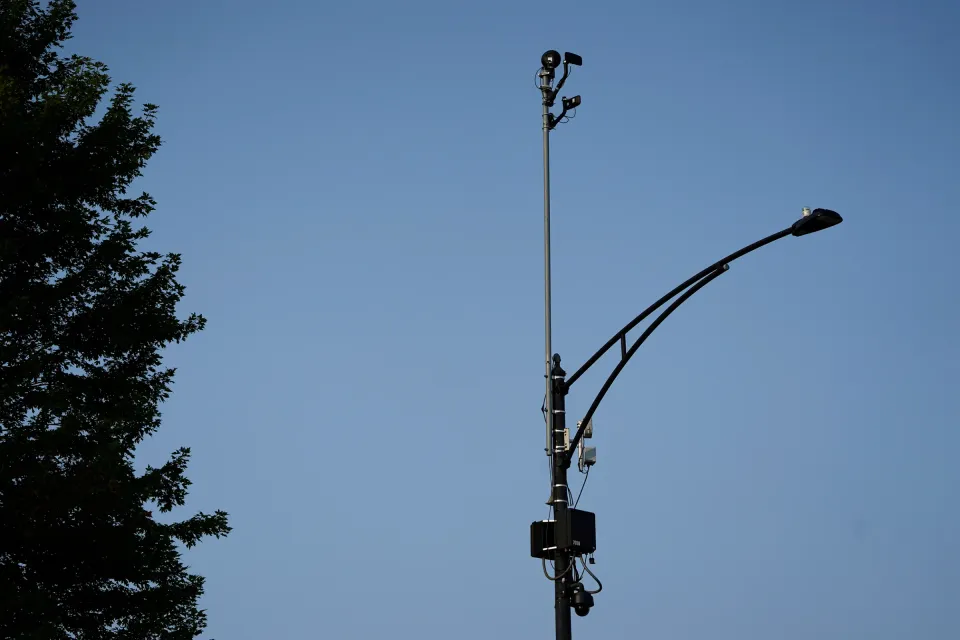ShotSpotter on the rocks

Chicago dropped its contract with a major police surveillance firm, but there’s a bigger fight on the horizon
On Tuesday, Chicago Mayor Brandon Johnson announced that he won’t renew the city’s contract with ShotSpotter, a heavily criticized police surveillance system that says it “detects” gunshots with a network of always-on microphones. It’s a long-established fact that ShotSpotter is inaccurate, wasteful, and racist, but venture capital money and insistent federal lobbying have kept the company afloat. The Chicago news might start to turn the tide.
Chicago installed its first ShotSpotter sensors in 2012. By 2022, the city’s contract accounted for 11% of ShotSpotter’s parent company’s revenue. Brandon Johnson campaigned on dropping ShotSpotter—when he was elected, the company’s stock fell 31%.
So, Johnson’s announcement is bigger than a privacy victory: it’s a significant financial loss for one of the largest and best-advertised police tech firms. SoundThinking, ShotSpotter’s parent, wants to become a predictive policing monopoly. It’s awesome, in the og “filled with awe” sense, that waves of anti-surveillance organizing are getting in the way.
Like other cities who have ended their gunshot detection contracts, Chicago will have a couple loose ends to tie up over the summer (this piece from reporter Matt Stroud shows how some of the logistics might go down). But although this deinstall is a landmark in the fight against discriminatory police surveillance, activists and organizers know that it’s only one head of the Medusa.
In so many cities, the surveil-and-punish mentality is endemic. Police are given millions to throw at private companies like ShotSpotter that have no financial incentive to actually reduce crime. Chicago’s 2024 police budget is $1.99 billion, an increase of $900,000 over last year. They’ll get an additional $75 million in security funding for August’s Democratic National Convention. That’s a lot of room for unproven or flat-out faulty policing tech like facial recognition, predictive AI, and ALPRs to creep in.
Fighting this stuff takes a broader message than “get those microphones down.” The success of campaigns like StopShotSpotter grows out of their abolitionist framework. These campaigns aren't just fighting biased tech, but helping people consider where the money that's spent on surveillance could go.

In Detroit, where the city council considered using $7 million earmarked for Covid relief to expand police surveillance, Branden Snyder of Detroit Action put it this way: “The reason why we’re in these policing fights, as an economic justice organization, is that our members are folks who are looking for housing, rental support, looking for job access. And what we’re given instead is surveillance technology.”
When cities choose surveillance, they’re choosing against something else. Would you rather have affordable housing, utility vouchers, library services, and after-school programs, or… more cops that don’t even come when you call? More microphones that clog the skies and don’t reduce crime? These are the questions, and they are super effective against the police tech firms that are probably, at this moment, dropping Minority Report cracks into their investor reports.
SpotSpotter’s parent company will hold its Q1 earning call sometime next week. I’m excited to see their response to the inevitable “Why have you lost your second-largest client?” They’re not going to “the good guys won,” but I hope some of them believe it.
Thanks for reading! If you like the newsletter, consider giving it a forward or two.
Stray Links
- Related to the above: violent crime is falling across the nation. Why do 77% of Americans believe it's rising instead?
- Here's some more Midwest Success: Michigan has repealed its anti-union "Right-to-Work" law, the first state to do so in almost 60 years.
- An investigative report: tech and real estate billionaires are organizing a "hostile takeover" of the San Francisco city government, pushing conservative policies with a flood of dark money.

Member discussion